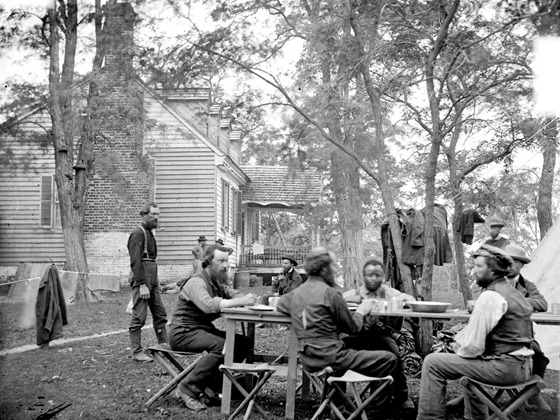Camp Flat Top, May 26, 1862.
Dearest: — Your excellent letters of [the] 17th and 19th came this morning — only a week in getting to me. I wrote you yesterday by the soldiers, Corporal West and Harper, but I must give you another by the sutler who goes in the morning, just to show how much I think of you and your letters.
We are now at rest on a mountain top with no immediate prospect of anything stirring. We stand for the moment on the defensive, and are not likely to be disturbed. We have been having exchanges of wounded and prisoners with the enemy. They have behaved very well to our men, and were exceedingly civil and hospitable in our negotiations with them. They feel a good deal discouraged with the general prospect, but are crowding our small armies under Banks and Fremont pretty severely. All will be well if we carry the pivots at Richmond and Corinth. Enough of this.
I still feel just as I told you, that I shall come safely out of this war. I felt so the other day when danger was near. I certainly enjoyed the excitement of fighting our way out of Giles to the Narrows as much as any excitement I ever experienced. I had a good deal of anxiety the first hour or two on account of my command, but not a particle on my own account. After that, and after I saw we were getting on well, it was really jolly. We all joked and laughed and cheered constantly. Old Captain Drake said it was the best Fourth of July he ever had. I had in mind Theo. Wright singing “The Star-Spangled Banner.” “The bombs bursting in air” began before it was quite light, and it seemed to me a sort of acting of the song, and in a pleasant way, the prayer would float through my thoughts, “In the dread hour of battle, O God, be thou nigh!”
A happy thing you did for the sick soldiers, good wife![1] “I love you so much.” Well, that is all I wrote to tell you. I must repeat again, send the Commercial “for the war.” Tell Webb Lieutenant Kennedy was delighted with the picture, and will try to send his to Webb some day. Send me one of all the boys if you get them — Webb’s of course. I am much pleased that you are to stay in Cincinnati. Love to all the boys and Grandma. Send me by sutler Harper and Atlantic for June. Good-bye, dearest.
Affectionately ever,
R.
P. S. — I enclose you a letter which I wish Dr. Murphy [to read] or somebody to read to him. He behaves badly, I suspect. In short, darling, all men who manage to keep away from their regiments are to be suspected. They are generally rascals.
Mrs. Hayes.
[1] Mrs. Hayes, in her letter of May 19, had written: “Our hospitals are all full of sick and wounded. A great difference can be seen between the sick and [the] wounded. The sick appear low-spirited — downcast, while the wounded are quite cheerful, hoping soon to be well. I felt right happy the other day, feeling that I had made some persons feel a little happier. Going down to Mrs. Herron’s I passed four soldiers, two wounded and two sick. They were sitting on the pavement in front of the office where their papers are given to them. I passed them, and then thought, well, anyhow, I will go back and ask them where they are going. A gentleman who I saw then was with them, said he had just got in from Camp Dennison, and found they were too late to get their tickets for that evening. I asked, ‘Where will you take them?’ He said he did not know, but must get them to the nearest place, as they were very weak. I said, ‘Doctor, (the wounded man had told me he was his family doctor and had come to take him home), if you will take them to my house I will gladly keep them and have them taken to the cars. There is the street-car which will take you near my house.’ He was very thankful, and he put sick and wounded on, and I started them for Sixth Street, while I finished my errand, took the next car, and found my lame man hobbling slowly along. We fixed them in the back parlor. The doctor I asked to stay also, to attend to them. He said he could not thank me enough, that he was a stranger here and was almost bewildered as to what to do or where to take them. Mary was up early and we had a cup of coffee for them before five. I thought of you in a strange country, wounded and trying to get home. The cases were not exactly alike, but if anyone was kind to you, would I not feel thankful?”


 MAY 26TH.—Gen. Lee is still strengthening the army. Every day additional regiments are coming. We are now so strong that no one fears the result when the great battle takes place. McClellan has delayed too long, and he is doomed to defeat. The tobacco savers know it well, and their faces exhibit chagrin and disappointment. Their fortunes will not be made this year, and so their reputations may be saved.
MAY 26TH.—Gen. Lee is still strengthening the army. Every day additional regiments are coming. We are now so strong that no one fears the result when the great battle takes place. McClellan has delayed too long, and he is doomed to defeat. The tobacco savers know it well, and their faces exhibit chagrin and disappointment. Their fortunes will not be made this year, and so their reputations may be saved.






